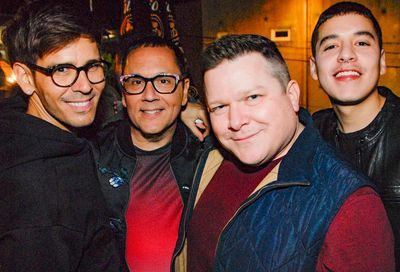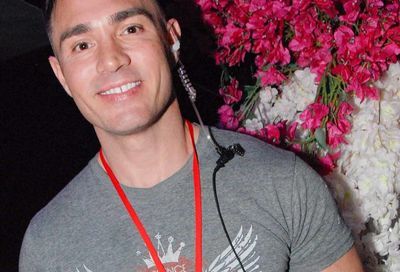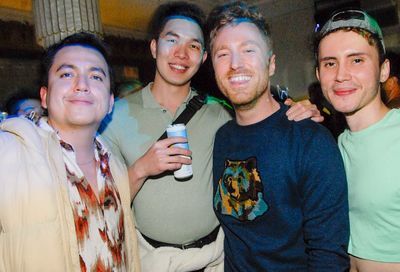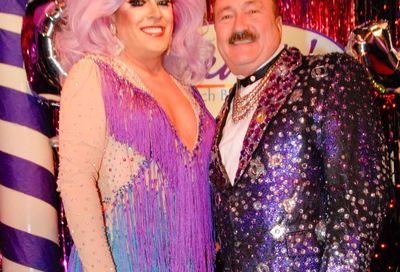A Visit from Ellen
Learning Curve
“Do you remember what day this is?” my girlfriend breathed into the phone. So I raced through my mental Rolodex. It wasn’t our anniversary, or a birthday. What could April 30th mean to us?
“On this day in 1997, Ellen DeGeneres came out on national television,” she reminded me. And I paused to reflect, yet again, on the power that moment had for so many millions of us — whether you watched the infamous episode alone in front of a flickering television, or with friends and onion dip and a big screen, or at one of GLAAD’s various and well-organized parties. I watched Ellen’s coming-out episode from a D.C. hotel room with my friend Faith Rogow, a specialist in media literacy; eyes riveted to the tube, we carefully took notes on the commercials airing during that hour, in order to appreciate which sponsors dared to support the mainstreaming of lesbian visibility.
Since then, for my Intro to Women’s Studies class I’ve regularly screened The Real Ellen Story, a top-notch documentary chronicling the personal and industry decisions behind Ellen’s coming out on ABC. My students, at nineteen or twenty, were barely ninth-graders in 1997, and most of them take for granted current cable options such as HBO’s Queer as Folk and the Gay Weddings series on Bravo. They’re surprised that Ellen generated so much controversy “back then” — in just half a dozen years, a giant breakthrough for lesbian activists my age has quickly become old history.
Luckily, I had the opportunity to observe gay and lesbian America’s ongoing gratitude to Ellen earlier this spring, when she performed her signature standup comedy at Lisner Auditorium for two nights. Ellen explained to the packed house that normally her tours through D.C. placed her at the Kennedy Center, but that Lisner was preferable as a venue because its design was more intimate. For me, that night of performer-audience intimacy drew together my personal and professional selves: Lisner is right on the campus of George Washington University, where I’ve taught women’s studies as an openly lesbian professor for almost ten years. Onstage at Lisner, Ellen stood across the street from the large lecture hall where my classes meet. I felt cradled by the elements of the environment that night — Ellen had come to my workplace.
|
It was after the performance that I witnessed something extraordinary. Hundreds of happy lesbian couples, dressed in concert-going finery and funk, slowly streamed out of the auditorium and across campus. It was a beautiful night, blossoms at peak and releasing their scent, and the night still young, so that fans took their time finding their way back to cars. A sold-out show at an urban university with limited parking meant that people had left their cars everywhere on the perimeter of the entire Foggy Bottom campus.
In the soft glow of streetlamps, I watched as George Washington University abruptly flared into dyke central — along the paths, in front of the library, in all the nooks and crannies that surround my office and classrooms, lesbians in high spirits and silk shirts walked toward cars, laughing, replaying the concert’s highlights. Students, squirreled away writing final papers, paid little heed to this sight of a temporarily all-gay schoolyard. It was as though the entire undergraduate population had temporarily switched places with guests from Planet Lesbos — a nice twist on Invasion of the Body Snatchers.
From the comfort of my own car, tape player mischievously cranked up to blast Alice Cooper’s “School’s Out” (an irony of title I’m sure he never intended), I cruised my workplace and checked out girls. My car idled in front of the women’s studies building. Couples poured around me and down 22nd Street, lesbians parting the Red Sea of academia. “And how ya doing?” I shouted to one and all, unrepentantly exuberant.
This, too, is a coming out of a kind. For while I may be cozily out at work, able to mentor young lesbian students, unfettered by overt homophobia from my own supervisors or colleagues, I’m still — surprise! — a minority, even in women’s studies. I don’t normally see amber waves of homos rippling across my campus, and while our undergraduate enrollment is now almost 60 percent female, that landscape of smart and serious young women is not necessarily 100 percent gay-friendly.
And thus I was surprised to feel a wistful awe on that one evening when lesbians seemed to take over the campus streets and steps so comfortably — what would it be like to attend, or work at, an all-lesbian school? Except during Pride marches and similar events, few of us are able to experience what being the majority feels and looks like in our own local landscape. It is moving, and beautiful — and unexpected. And so I told my girlfriend that yes, six years later, I have new cause to be grateful to Ellen DeGeneres, for the wave of lesbian visibility that still follows in her wake.
Bonnie Morris can be reached at bmorris@metroweekly.com.
Support Metro Weekly’s Journalism
These are challenging times for news organizations. And yet it’s crucial we stay active and provide vital resources and information to both our local readers and the world. So won’t you please take a moment and consider supporting Metro Weekly with a membership? For as little as $5 a month, you can help ensure Metro Weekly magazine and MetroWeekly.com remain free, viable resources as we provide the best, most diverse, culturally-resonant LGBTQ coverage in both the D.C. region and around the world. Memberships come with exclusive perks and discounts, your own personal digital delivery of each week’s magazine (and an archive), access to our Member's Lounge when it launches this fall, and exclusive members-only items like Metro Weekly Membership Mugs and Tote Bags! Check out all our membership levels here and please join us today!


















